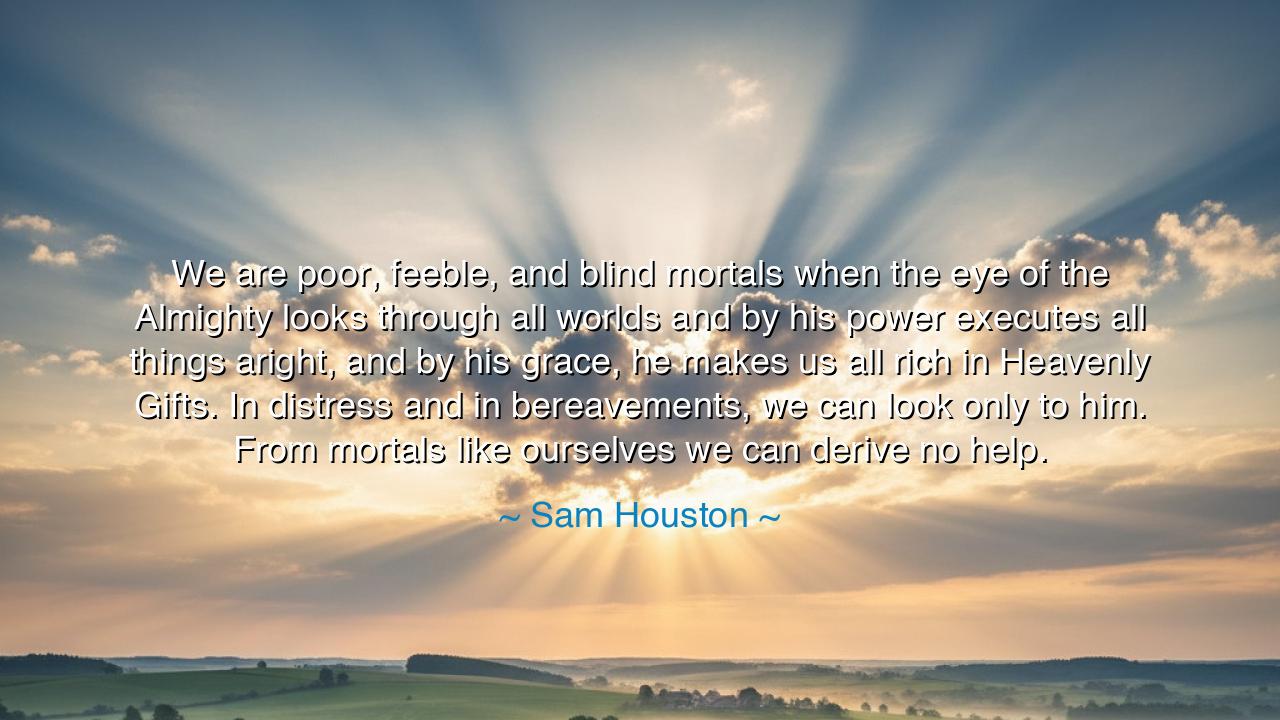
We are poor, feeble, and blind mortals when the eye of the
We are poor, feeble, and blind mortals when the eye of the Almighty looks through all worlds and by his power executes all things aright, and by his grace, he makes us all rich in Heavenly Gifts. In distress and in bereavements, we can look only to him. From mortals like ourselves we can derive no help.






Hearken, children of the ages, to the solemn words of Sam Houston, who proclaimed: “We are poor, feeble, and blind mortals when the eye of the Almighty looks through all worlds and by his power executes all things aright, and by his grace, he makes us all rich in Heavenly Gifts. In distress and in bereavements, we can look only to him. From mortals like ourselves we can derive no help.” In these words lies the eternal truth of human frailty and divine providence. Houston reminds us that in the vast order of the cosmos, the power of mortals is limited; only through reliance upon the Almighty can one find strength, guidance, and the bounty of spiritual riches.
Houston speaks to the humility of human existence. The trials of life—sorrow, loss, and hardship—reveal our feebleness and our blindness to the larger design of the universe. In such moments, reliance on mere human counsel is insufficient; it is only through the grace of the divine that solace, understanding, and true assistance may be found. Here lies the lesson of faith and dependence, a principle honored by sages and prophets across the ages.
Consider the life of King David, who, though mighty in battle and wise in governance, found himself in times of grief and peril utterly reliant upon the mercy of God. When beset by enemies and stricken by loss, David’s prayers and devotion were the only true source of strength and guidance. Houston’s reflection mirrors this ancient example: in moments of distress, mortal efforts alone cannot sustain the soul, but the grace of the Almighty imparts heavenly gifts that fortify and uplift.
The ancients themselves spoke of the limitations of mortal power and the necessity of divine reliance. From the philosophers of Greece who invoked the gods in counsel, to the prophets of Israel who sought wisdom from above, the recognition of human frailty and blindness was a path to virtue and understanding. Houston emphasizes that only through faith and grace can one navigate the storms of life and endure the trials that mortals inevitably face.
Thus, his words are both admonition and comfort: recognize the limits of human strength, honor the gifts bestowed by divine providence, and turn in times of sorrow to the source of all power and wisdom. Mortals may offer counsel, but it is the Almighty whose eye oversees all worlds and whose grace enriches the spirit with enduring gifts.
Carry this teaching, children of generations yet unborn: in moments of loss, fear, and helplessness, look beyond the frailty of your own kind. Seek the guidance and bounty of the Almighty, for in divine providence alone lies true strength, solace, and the eternal treasure of heavenly gifts.






NGDat Nguyen Gia
This quote reveals a deep sense of faith and surrender, but also a worldview shaped by hardship. It suggests that true strength lies in recognizing our dependence on something greater than ourselves. I wonder if Houston’s experiences in war and loss influenced this perspective. There’s a kind of peace in acknowledging our limits, yet it raises a question: does turning solely to the divine mean we give up on earthly support and resilience?
TNNguyen Thao Ngan
I’m struck by the humility in these words. They acknowledge both the vastness of divine wisdom and the smallness of human understanding. It makes me reflect on how often we seek control over life when perhaps we should surrender more to faith. Still, I question whether viewing humans as helpless minimizes our moral responsibility to act with compassion. Can divine reliance and human effort coexist without one diminishing the other?
AAn
This reflection feels very sincere, as if born from real suffering. It’s easy to sense Houston’s conviction that in loss and distress, human aid falls short. Yet I wonder if this belief isolates people during hardship. If we turn only to God, do we risk missing the comfort of those who are also divine creations? Maybe the grace he speaks of manifests partly through others—the hands, words, and empathy of fellow mortals.
PNDuong Dang Phuong Nam
I find this statement moving, though a bit somber. It acknowledges human weakness while glorifying divine perfection. Houston’s words make me think about the balance between humility and helplessness—should we see ourselves as powerless, or as instruments through which divine grace operates? Maybe the point is not to deny our agency, but to recognize that strength and wisdom ultimately come from a higher source. It’s a deeply spiritual and reflective perspective.
TNNguyen The Nguyen
This quote feels both humbling and comforting. Houston seems to express complete dependence on divine power, especially in times of suffering. I admire the faith behind it, but I can’t help but wonder—does this view underestimate the value of human compassion and community? Perhaps divine grace and human kindness work together rather than separately. Still, I understand the sentiment that in moments of despair, people often find peace only through faith.